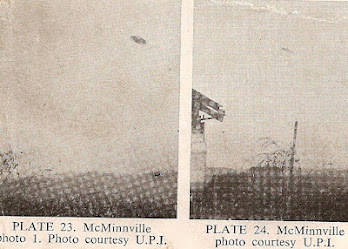Magnified views of the Mc Minnville Artifact from Condon UFO Study
If one demands a scientific source as the basis of putative alien intelligence visiting Earth, one can do no better than enlisting Physicist Edward U. Condon’s Air Force- commissioned Scientific Study of Unidentified Flying Objects(1969, NY Times Books) While most of the cases are exposed as either natural or meteorological phenomena – or possible hoaxes- one case stands out: Case 46, p. 396 from McMinnville Ore. (11 May, 1950) that concludes - and I quote, from p. 407:
:"This is one of the few UFO reports in which all factors investigated: geometric, psychological and physical appear to be consistent with the assertion that an extraordinary flying object- silvery, metallic and disc shaped flew within sight of two witnesses. "
I found the best part of the case study was the photometric analysis (pp. 402-06). This was essential in order to discriminate luminance conditions between a hypothetical hand model nearby and an actual, extraordinary, distant flying object. The key observation made by the investigators was:
"The shadowed bottom of the UFO (see image) has a particularly pale look suggestive of scattering between observer and object. If such scattering is detectable it may be possible to make some estimate of the distance involved".
From there they list several possible interpretations, including: optical fabrication or double exposure (rejected because the UFO is darker than the sky background luminance); a retouch of a drawn image (rejected because analysis of the negatives disclosed they were unretouched); physical fabrication using a 'frisbee' hand spun model (rejected because the UFO displays an off-axis pole which is never seen displaced, i.e. in rotation); model suspended from a wire (similar positions in each photo -so possible), and extraordinary flying object (since photometry suggests a large distance).
So, in the end, the last two interpretations had to be analyzed for consistency with the least likely of the two rejected.
The investigators proceeded by computation of the luminance, or the apparent brightness of an object at a distance r, normalized relative to some intrinsic value B(o) at r(o), viz p. 402:
B = B(sky) (1 - exp(-br)) + B(o) exp(-br)
"Since all measures must be based on the witnesses' two photographs, we will determine b for the given day from the photographs themselves. Normalizing all brightnesses (measured from the film and assuming that the images fall on the linear portion of the gamma curve (see- e.g. http://en.wikipedia.org/wiki/Gamma_correction) to that of the sky near the horizon, i.e. on a line within a few thousand feet of the ground, where the UFO is constrained to be by the reported cloud height and probable nearness to the camera, we have:
B = 1 + exp(-br)[B(o) - 1]"
From the above, if the object is sufficiently distant we would have:
exp(-br) -> 0
So therefore,
B = 1 + exp (0)[B(o) - 1] = 1 + [B(o) - 1] and B equals the sky brightness. (in optical terms, the optical depth t >> 1)
To ascertain whether the claimed sighting photographed is a fake then, all that's needed is to solve for the distance r, given a zero distance luminance B(o) compared to an observed luminance B. As can be seen from tjhe equation, to do this one needs to obtain the scattering coefficient, b.
The investigators used densitometric analysis to obtain an assorted range of values for the luminance B, for different objects appearing in the photographic image - these are presented in Table 2, from the Case Study. (Shown, with comparison of two plates, 23 and 24).
Processing all this data in concert, the investigators obtained the distance r = 0.32 km, or just over 1,050 feet as the distance to the object - nearly one fifth of a mile. The investigators graphically illustrated the domains of the two hypotheses via their graph (Fig. 3) which is appended here. As they note (p. 406):
"If the object is a model suspended from a wire only a few meters away the surface is some 37% brighter (B = 1.21 v. B = 0.885) than the tank and the shaded portion is probably more than 40% brighter than the shadow on the tank...nearly impossible to maintain in the face of the photometry.
The shadowed side of the UFO appears so bright that it suggests significant scattering between it and the observer"
In other words, conforming with the distance calculated from the luminances*. As usual with most extraordinary UFO sightings the skeptics will come out of the woodwork and this case was no different. However, subsequent investigation by Bruce Maccabee, an optical physicist for the U.S. Navy determined there was no evidence for a hoax. After completing his own analysis Maccabee concluded that the photographs were not hoaxed and showed a "real, physical object" in the sky above the Trent farm.
But
this was a rural Oregon couple in 1950 and it beggars the imagination they’d go
to so much trouble to create a “hoax” - including taking care to get just the right luminance of the object and pivoting an off- axis 'spike' to eliminate rotation. All of which
led me (at the time, 1980s) to compare
Klass and sidekick Sheaffer to “ambulance chaser” lawyers who look for personal
injury cases to up their profiles. In their case, looking for sound UFO cases to debunk. Let's also bear in mind I have actually published a UFO analysis in a peer -reviewed scientific journal (Journal of the Royal Astronomical Society of Canada):
Transient
Optical Phenomena of the Atmosphere - a Case Study - NASA/ADS (harvard.edu)
Are "glitches'- are willing to drop their prosaic focus and terrestrial chauvinism.
(*Note: the Condon investigators examined one last fake
model possibility, with top and bottom sections painted differently- or an
aluminum pie pan sealed on the bottom with white paper. However, they again
ruled this out based on the photometry).





No comments:
Post a Comment